Another “easy to follow” guide on what your (re: my) procrastination habits actually mean:
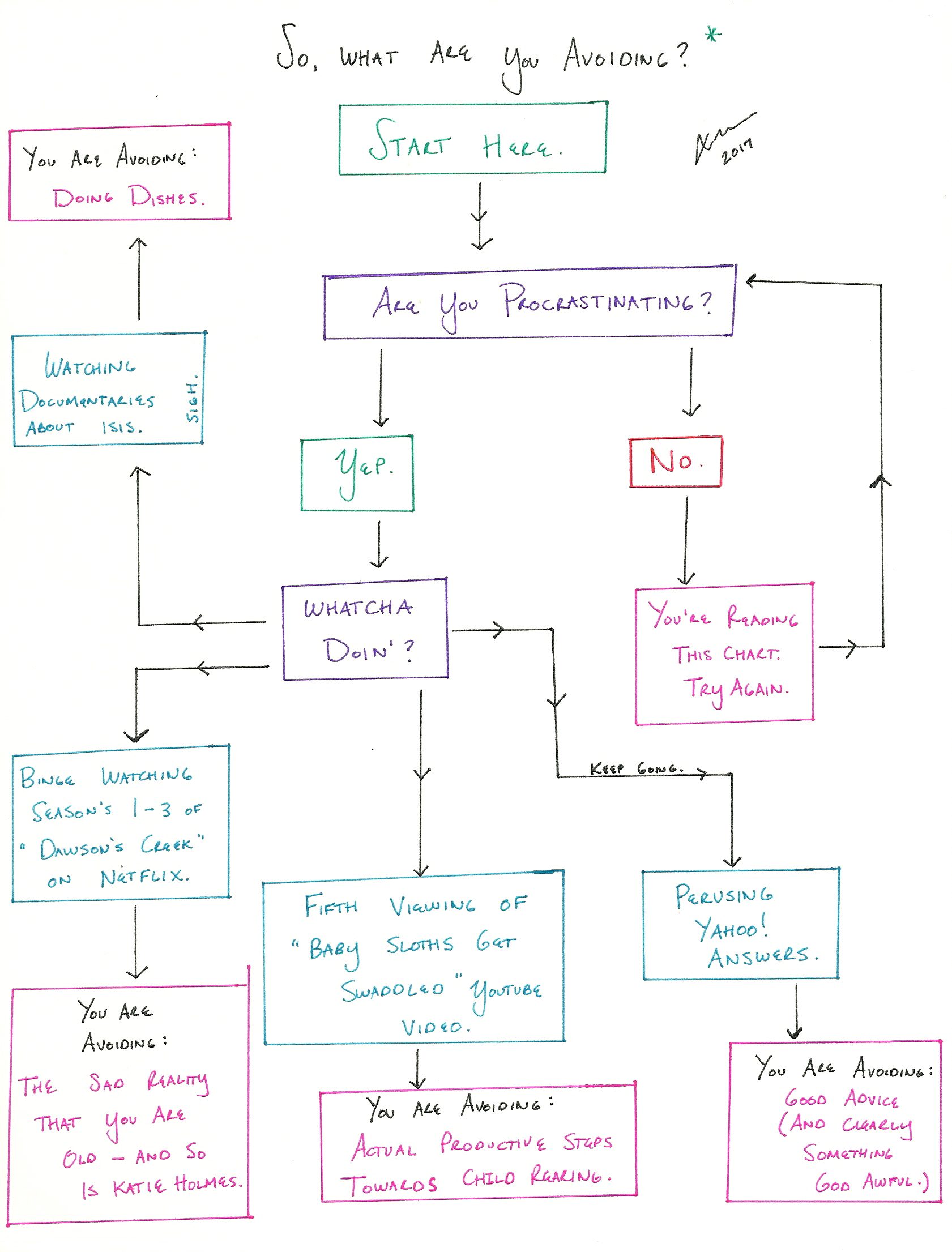
—
*Editor’s Note: The alternative title of this flow chart (and every flow chart I make) is “Will it be yes or will it be sorry?”
Another “easy to follow” guide on what your (re: my) procrastination habits actually mean:

—
*Editor’s Note: The alternative title of this flow chart (and every flow chart I make) is “Will it be yes or will it be sorry?”
I want to begin this entry by stating that I am not the biggest fan of “self-help” or the Oprah-esque motto that we should always be living our best lives. I think life is recursive and akin to writing – constantly in a state of revision, never devoid of imperfection, always in drafting mode and never final.
That being said, this blog post is going to be the closest thing I write to a self-help, life-hack, live your best life, how to fucking YOLO! piece of writing. Over the last few months, I have found myself in social situations where friends have expressed their concern about the state of national dialogue and the questionable decisions made by our newly elected administration.
The discussion, without fail, always pivots to an on-going question of what can I do? Should I send my leftover NSYNC Christmas cards from 2003 and hand write shit like “Don’t say Bye, Bye, Bye to the Affordable Care Act”? Should I plan another gay dance party in front of Mike Pence’s house? Should I make another protest sign? Most of all, is this sustainable?
I’ve thought a lot about the question and have made a few adjustments to my personal life over the past few months. In my own search to the what can I do question, I’ve come up with my answer that I’ll be sharing in this piece – that through reflection, we should foster and harness our individual talents to contribute for the betterment of our world. Oprah probably said this first, but whatever.
A what can I do answer in three parts – developing a life philosophy, removing obstacles, and getting your shit together.
—
Life Philosophy – the Why?
A few months ago, I had a chance to get an advanced copy of Angela Duckworth’s Grit, which has become the latest popularized social psychology idea (and thus the concept everyone likes to shit on these days). Although I would highly recommend reading the entire book and theory in full, she has a six-minute TED Talk that has become wildly viral, summarizes the concept well, and prevents you from having to engage in the perishing, near extinct practice of reading words on paper.
Duckworth’s main analysis is that passion, intentional practice, and long-term perseverance are the drivers of the success – not innate genius. I see a lot of credence with the criticism. However, what interested me the most is that grit can also be synonymous with focus and vision. Having a definitive life philosophy is, according to Duckworth, a guiding principle to organizing our goals, excluding projects that don’t add anything to our life philosophy and bringing focus to our decisions on a day-to-day basis.
An example – like most people, I devoted my 20’s putzing around and spending a lot of time in dive bars loudly and drunkenly discussing that I was going to fucking do everything all the god damn time! I wanted to experience and accomplish everything. Accordingly, I created giant lists of goals with no particular theme except that I needed to cross everything off lest I become a cat-lady living an obscure, indistinguishable life.
Below is a list I literally wrote and published in 2010 at the age of 23. Although my goals may have changed over time, my penchant to write with only fine-tipped pens on card stock with intentional color-coding has not changed:
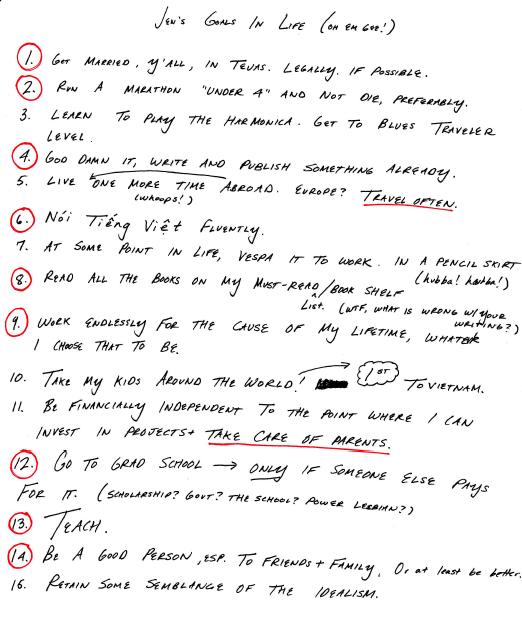
Seven years later, I can attest that there are some good goals here (that I accomplished!), but it’s in a terrible list-like structure. Everything felt scattered, which made it difficult to intentionally work towards something.
Enter Angela Duckworth, who suggests having one single life philosophy and a tiered set of no more than five goals that align with that philosophy. Any project or task that doesn’t lead back to that philosophy is considered miscellaneous and should be placed on the back burner.
A month after the most recent election cycle, my head was filled with so many ideas and so many ambitions – learn to knit to make a pussy hat! Register more Mexicans to vote in Texas! Bake a lot of sassy cupcakes! – that it was difficult to focus my energy on tasks that felt collectively productive. So, I asked myself what my role is in our movement towards a better future (my life philosophy) and then set up 5 focused goals leading back to my vision. For reference, mine are below, which I post to keep myself accountable:
Life Philosophy: Practice and cultivate empathy by (1) writing to tell my story and the stories that best reflect how my experiences shaped my worldview and (2) supporting others to help them realize their own stories.
Goals:
—
Self-Reflection – Removing Obstacles
The other important concept I’ve integrated in my life is one I have learned by regularly seeing a therapist who specializes in Acceptance and Commitment Therapy (ACT). Let me begin by stating that I am not ashamed of seeing a therapist and anyone who is thinks that its a shameful, stupid experience should probably see a therapist (let’s talk!).
As someone who feels anxiety about not living up to my life philosophy, ACT has been exceptionally helpful in practicing ways to cope with and accept that anxiety. The most important concept I have learned is breaking the procrastination cycle, which has been key to helping me focus on my goals.
You’ve probably experienced it before, but here’s a visual depiction of the procrastination cycle, which has been the biggest obstacle to life philosophy work and actually creates more anxiety:
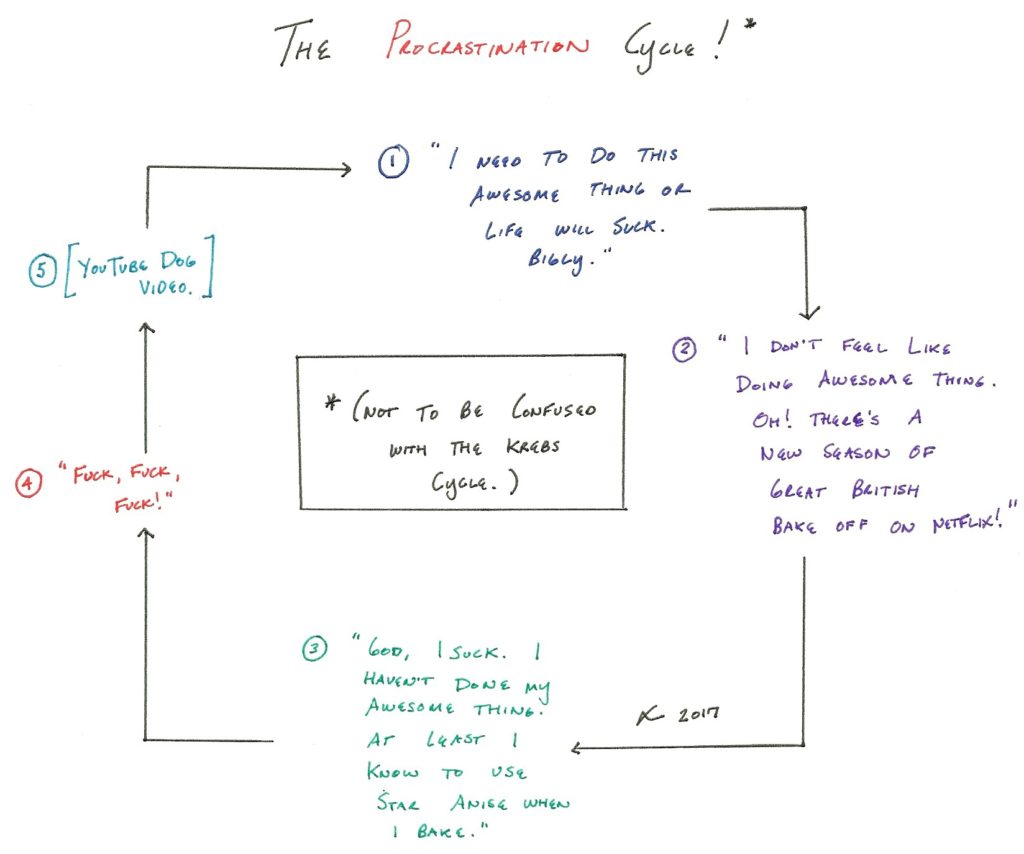
—
Getting Your Shit Together – The How
Thoughts, goals, and resolve are nothing without action. My therapist likes to use the refrain that admitting something is always the hardest part in personal change. I would argue that doing the actual shit to change is the hardest part.
For this section, I’m going to write the word “shit” a lot and I’ll be deferring to two books that have been helpful to me: David Allen’s Getting Things Done and Charles Duhigg’s The Habit Loop. For those of you who prefer not reading and like learning things in meme, a summary below:
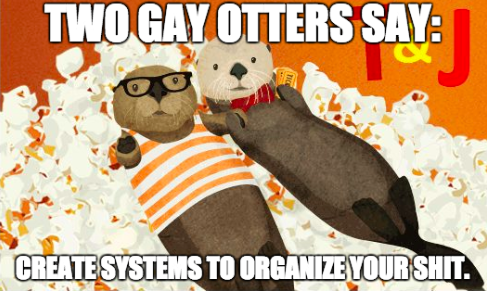
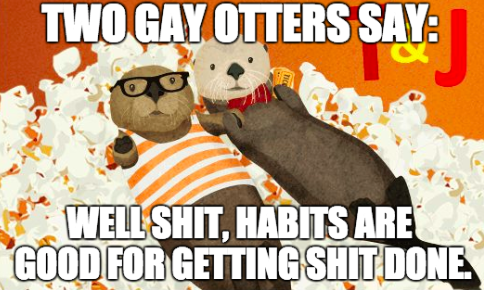
Taking into account my life philosophy and to help me break out of the procrastination cycle, here are some of my habits and organizational structure that have been tremendously helpful, although I’m still a work in progress about following through:
—
*Editor’s Note: Sike! Except next Monday. I’ll be taking a break because I’ll out of town and focusing on a long-form piece. Yes, longer than this piece.